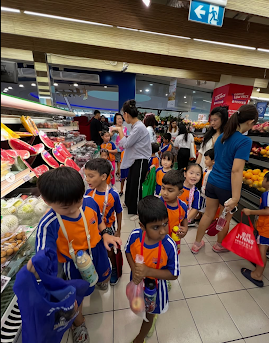A small sea of blue-and-orange uniforms brightened Rivervale Mall as our St Anne and Sengkang children set off on their supermarket adventure. Guided by teachers and eager parent volunteers, the children paused for a group photo beneath the “Welcome to Rivervale Mall” sign before filing into the produce section, reusable bags swinging by their sides. Inside, they compared the vibrant colours of dragon fruit, oranges, and leafy greens, hunting for the Healthy Choice symbols and chatting excitedly about what makes a food “good for our bodies.” Laden with their carefully chosen items, the class later walked back through the neighbourhood in neat pairs.
Organising real-world excursions like this nurtures far more than curiosity about groceries. A hands-on setting sparks children’s natural drive to observe, question, and categorise, boosting cognitive growth and vocabulary as they name fruits, weigh prices, and link symbols to healthy eating. Navigating store aisles together strengthens social and self-management skills, while the physical act of selecting produce engages fine- and gross-motor development. Most importantly, authentic experiences make abstract classroom lessons tangible, deepening understanding and igniting long-term healthy habits.
At Sheffield Kidsworld, such field trips are woven into our Multiple Intelligences-inspired curriculum, ensuring every child learns through a mix of bodily-kinesthetic movement, interpersonal collaboration, logical-mathematical reasoning, and linguistic expression. By blending classroom projects with community outings, we empower children to connect knowledge to daily life, build confidence, and cultivate lifelong wellbeing, one supermarket visit, nature walk, or neighbourhood exploration at a time.



Comments
Post a Comment